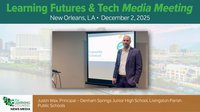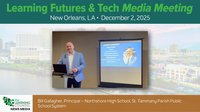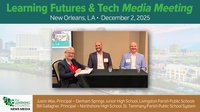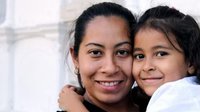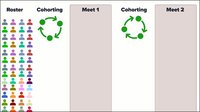KinderLab Robotics today announced that it has donated four KIBO robot kits to La Puerta Abierta, a school in Santiago Atitlán, Guatemala. Part of a partnership with Sewickley Academy, near Pittsburgh, PA, this donation will foster cross-cultural collaboration between the schools. Sewickley’s 5th-graders, who have experience teaching younger students about robotics through the school’s Big Buddies program, will offer guidance to La Puerta Abierta’s 1st-graders as they work on fun, hands-on programming challenges.
La Puerta Abierta, which relies heavily on volunteers and donations, was co-founded by Amanda Flayer, who was a Peace Corps volunteer with Michelle Bonham, a Lower School Spanish teacher at Sewickley Academy. The two schools have previously collaborated by having their 5th-graders create a bilingual book together. When La Puerta Abierta secured mathematics professor and data analyst Gaspar Yataz Pop as a volunteer to teach robotics using KIBO, the idea for the STEAM-powered collaboration between the schools’ students was born.
“We look forward to giving our elementary school students the opportunity to engage with another culture,” said Beau Blaser, director of technology at Sewickley Academy. “Through coding and collaboration, they'll be learning to connect ideas and concepts together from a great distance. That can lead to an appreciation of the different cultures, but also a realization that there's a lot of commonality across the human experience. What better way to do that than with some of our youngest learners? They’ll see that anybody can become an engineer or express their artistic ability—you can be anything you want to be in this world, whether you're from Guatemala or Sewickley, Pennsylvania.”
Because Guatemala has sporadic wireless access, Sewickley Academy chose the screen-free KIBO as the hands-on coding robot to share with La Puerta Abierta’s young students. Sewickley Academy’s computer science teacher Julia Tebbets and Bonham will offer Pop professional development on KIBO via Zoom or Google Meet. Students in Sewickley and Santiago Atitlán will then collaborate on programming projects beginning in early 2023. According to Tebbets, one initial idea is for students to program their KIBOs to do dances that reflect each culture.
“We are delighted to support this cross-cultural collaboration,” said Mitch Rosenberg, CEO of KinderLab Robotics Inc. “As KinderLab co-founder Marina Bers shows in her book Beyond Coding: How Children Learn Values Through Programming, KIBO’s screen-free, block-based programming system connects students who speak different languages and come from different cultures. Working together to bring their robots to life in fun STEAM projects will show the students in America and Guatemala how the power of collaboration—like the power of STEAM thinking—transcends all borders.”
About KIBO – The Playful STEAM Robot
KIBO is a robot kit that allows children aged 4–10 to build, program, decorate, and bring their own robot to life without requiring any screen time on a smartphone, tablet, or computer. With art and building, students transform KIBO into imagined animals, vehicles, storybook characters, and more. When children create their own robot, they perceive it as play, but they are learning invaluable STEAM skills. Not only are these hands-on experiences inherently rewarding, but they help children understand the technology in their world and can even improve their future job prospects.
About KinderLab Robotics
KinderLab Robotics is the creator of the award-winning KIBO, a playful, educational STEAM robot kit based on 20+ years of child development research with thousands of children, teachers, and parents. Developed specifically for teachers by Dr. Marina Umaschi Bers at Boston College, KIBO is currently used in 70+ countries and has proven efficacy in helping kids learn STEAM—and getting them excited about it! KinderLab offers a complete suite of teaching materials that help integrate STEAM elements into a wide range of curricula, including art, cultural studies, and reading literacy. For more information, please visit KinderLabRobotics.com.




